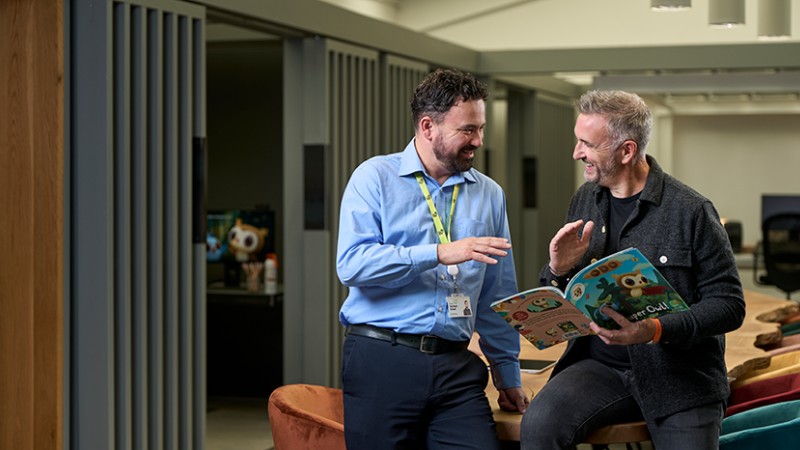Bridging the skills gap: how academia and industry collaboration benefits the economy

This article was originally published in the Irish News.
The ‘NI Skills Barometer’ report suggests that Northern Ireland needs more than 5,000 additional workers per year to grow the economy.
Planning for the future skills we need, and addressing any immediate gaps, is much easier when there is close collaboration between business, academia and the public sector.
Investing in skills development, upskilling and lifelong learning will future-proof Northern Ireland’s priority sectors and encourage the development of good jobs – which is essential to growing our economy.
Triple helix collaboration
The ‘triple helix model of innovation’ refers to the collaboration between industry, academia and government.
When the triple helix works together, the research produced from industry-academia collaboration can influence policy development by providing fresh perspectives on shared problems. It can also influence funding, research decisions and opportunities, so that government and public bodies are better informed when allocating funding for future research.
Knowledge-sharing can strengthen economic and social development. The Knowledge Transfer Partnership (KTP) programme is a good example of triple helix collaboration. In Northern Ireland, it has been championed by Queen’s University Belfast, Ulster University and regional colleges, funded by Innovate UK, and supported by government bodies and industry partners, such as Invest NI.
The initiative has empowered 12,000 organisations since 1975 to invest in innovation and sustainable growth. KTP helps businesses innovate, graduates with recruitment, and provides academics with an opportunity to apply their research to real-world business challenges.
By encouraging more collaboration across the triple helix, we can boost skills development, drive productivity and inspire more innovation.
Private and social house builder, Braidwater Group, headquartered in Derry, identified a need to digitalise its processes to be more efficient in managing the business. Through the KTP programme, Braidwater partnered with the North West Regional College to develop a platform that streamlined its manual paper-based processes.
Watch the video below to learn more about the collaboration.
Another success of the KTP programme was Taranto, the piling, precast and foundation contractors based in Craigavon. Taranto has taken part in the KTP programme three times. Mostly recently, Taranto worked with Ulster University through KTP to use AI to increase the capacity of its sales function. Since the company could not find a suitable solution on the market, it worked with an associate from Ulster University to create its own software that would automate the costing of projects.
Watch the video below to learn more about the collaboration.
A focus on our priority sectors
Only 18% of people aged 25-64 in employment in NI received job-related education or training in the past three months, compared to 26% in the UK.
Collaboration across academia, industry and government can promote lifelong learning to motivate people to pursue personal or professional development.
This will be essential to maintaining growth in Northern Ireland’s priority sectors. NI’s priority sectors have the potential for high exports, productivity, and job creation. However, they need a highly skilled workforce with opportunities to pursue upskilling, reskilling or access to sustained education to keep on top of global industry developments.
With the steady push towards digitalisation, automation and advanced technology, job-related education is needed now more than ever. According to the 2025 ‘Future of Jobs’ report, technology-related roles, including Big Data Specialists and AI Specialists, were the fastest-growing jobs in percentage terms.
For those in sectors with low growth or productivity, upskilling or retraining is needed to stay competitive in the job market. Digital and technology skills remain some of the most sought-after by both academia and industry. In fact, 60% of employers said they expect broadening digital access will transform their business by 2030.
The NI Skills Barometer found that productivity and wages positively correlated with a person’s highest qualification. Furthermore, better-skilled working-age persons are more likely to be employed. Encouraging more partnerships between industry and academia can ensure people are better equipped with competitive skills, which improves employment rates, helps growth and, in turn, increases productivity levels.
What’s more, the results of industry-academia partnerships can save money for businesses in the long-term and prepare them for future developments in areas like automation and digitalisation, which are proven to boost productivity.
Together, industry, academia and government collaboration can accelerate digialisation and automation to drive business productivity, ensuring Northern Ireland stays competitive on the world stage.
The power of three
At Invest NI, we’re proud to support programmes like KTP. As a former KTP Associate, I have seen first-hand how these partnerships give businesses access to world class expertise while equipping graduates with valuable industry experience.
Industry-academia-government is the collaboration we need to prepare our people, industries, and economy for the future.




Comments